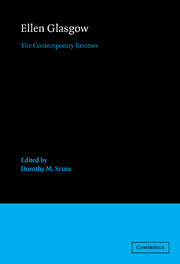Book contents
- Frontmatter
- Contents
- Series Editor's Preface
- Preface
- Acknowledgments
- Introduction
- The Descendant (1897)
- Phases of an Inferior Planet (1898)
- The Voice of the People (1900)
- The Battle-Ground (1902)
- The Freeman and Other Poems (1902)
- The Deliverance (1904)
- The Wheel of Life (1906)
- The Ancient Law (1908)
- The Romance of a Plain Man (1909)
- The Miller of Old Church (1911)
- Virginia (1913)
- Life and Gabriella (1916)
- The Builders (1919)
- One Man in His Time (1922)
- The Shadowy Third and Other Stories (1923)
- Barren Ground (1925)
- The Romantic Comedians (1926)
- They Stooped to Folly (1929)
- The Sheltered Life (1932)
- The Old Dominion Edition of the Works of Ellen Glasgow (1929-33)
- Vein of Iron (1935)
- The Virginia Edition of the Works of Ellen Glasgow (1938)
- In This Our Life (1941)
- A Certain Measure (1943)
- Index
The Deliverance (1904)
Published online by Cambridge University Press: 04 May 2010
- Frontmatter
- Contents
- Series Editor's Preface
- Preface
- Acknowledgments
- Introduction
- The Descendant (1897)
- Phases of an Inferior Planet (1898)
- The Voice of the People (1900)
- The Battle-Ground (1902)
- The Freeman and Other Poems (1902)
- The Deliverance (1904)
- The Wheel of Life (1906)
- The Ancient Law (1908)
- The Romance of a Plain Man (1909)
- The Miller of Old Church (1911)
- Virginia (1913)
- Life and Gabriella (1916)
- The Builders (1919)
- One Man in His Time (1922)
- The Shadowy Third and Other Stories (1923)
- Barren Ground (1925)
- The Romantic Comedians (1926)
- They Stooped to Folly (1929)
- The Sheltered Life (1932)
- The Old Dominion Edition of the Works of Ellen Glasgow (1929-33)
- Vein of Iron (1935)
- The Virginia Edition of the Works of Ellen Glasgow (1938)
- In This Our Life (1941)
- A Certain Measure (1943)
- Index
Summary
“Miss Glasgow's New Book,” Louisville Courier-Journal, 16 January 1904, sec. 1, p. 5
The usual quiet after the fall output of notable books has at last been broken. Like a great thunder storm on a peaceful summer day comes Miss Glasgow's The Deliverance, mighty in proportion, great in promise, magnificent in the fulfillment. Several years ago The Voice of the People and The Battle-Ground predicted better things to follow, and better things have followed. The Deliverance is a story of the tobacco fields of Virginia twenty years after the war. The reader at once feels grateful that the time is not during the war. Christopher Blake is the hero; by birth a gentleman, by fate a toiler in the tobacco fields. Several years before the story opens he is robbed of his birthright by his father's former overseer, Fletcher, who is now owner of Blake Hall. Within sight of his ancestral home, Christopher lives on a miserable patch of land with his sisters, his uncle and blind mother.
This mother, a belle and beauty of her day, is one of the most original characters in fiction. By her children's love she is shielded from every sorrow. Her blindness enables them to deceive her absolutely. She is still mistress of Blake Hall, still mistress of 400 slaves. She knows nothing of the poverty, her children's daily fight. In her world there is no hatred, no ruined young lives, no wrong. Miss Glasgow treats this unusual situation with a quiet dignity that makes the tragedy more intense.
- Type
- Chapter
- Information
- Ellen GlasgowThe Contemporary Reviews, pp. 77 - 96Publisher: Cambridge University PressPrint publication year: 1992



